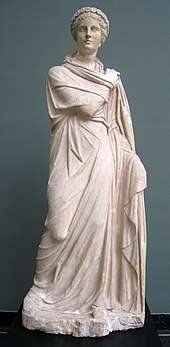Polyhymnia
Polyhymnia (/pɒliˈhɪmniə/; Greek: Πολυύμνια; "the one of many hymns"), alternatively Polymnia (Πολύμνια) was in Greek mythology the Muse of sacred poetry, sacred hymn, dance, and eloquence as well as agriculture and pantomime. Her name comes from the Greek words "poly" meaning "many" and "hymnos", which means "praise".[1] She is depicted as very serious, pensive and meditative, and often holding a finger to her mouth, dressed in a long cloak and veil and resting her elbow on a pillar. Polyhymnia is also sometimes credited as being the Muse of geometry and meditation.[2]

In Bibliotheca historica, Diodorus Siculus wrote, "Polyhymnia, because by her great (polle) praises (humnesis) she brings distinction to writers whose works have won for them immortal fame...".[3] She appears in Dante's Divine Comedy: Paradiso. Canto XXIII, line 56, and is referenced in modern works of fiction.
Polyhymnia was also described as the mother of Triptolemus by Cheimarrhoos, son of Ares[4], and of the musician Orpheus by Apollo.[5]
Polyhymnia in astronomy
In astronomy, there are nine asteroids named after the Muses. The one named after Polyhymnia is a main belt asteroid discovered by Jean Chacornac, a French astronomer, in 1854.[2]
Dedications
On Mount Parnassus, there was a spring that was sacred to Polyhymnia and the other Muses. It was said to flow between two big rocks above Delphi, then down into a large square basin. The water was used by the Pythia, who were priests and priestesses, for oracular purposes including divination.[2]
Depiction in arts
- Polyhymnia, Friedrich Ochs, 1857
 Polyhymnia, Milano
Polyhymnia, Milano Polyhymnia, Giovanni Baglione, 1620
Polyhymnia, Giovanni Baglione, 1620 Polyhymnia, Francesco del Cossa, 1455–1460
Polyhymnia, Francesco del Cossa, 1455–1460 Polyhymnia, Giuseppe Fagnani, 1869
Polyhymnia, Giuseppe Fagnani, 1869 Cast of Polyhymnia, Pushkin Museum, Moscow
Cast of Polyhymnia, Pushkin Museum, Moscow
References
- "Polyhymnia". theoi. Retrieved 2016-09-12.
- "Polyhymnia". talesbeyondbelief. Retrieved 2016-09-12.
- Diodorus Siculus Library of History (Books III - VIII). Translated by Oldfather, C. H. Loeb Classical Library Volumes 303 and 340. Cambridge, MA, Harvard University Press; London, William Heinemann Ltd. 1935.
- Scholia on Hesiod, Works and Days, 1, p. 28
- Scholia on Apollonius Rhodius, Argonautica 1.23
External links

- Primary sources and basic information concerning Polyhymnia
- Polyhymnia in painting
- Warburg Institute Iconographic Database (ca 50 images of Polyhymnia)